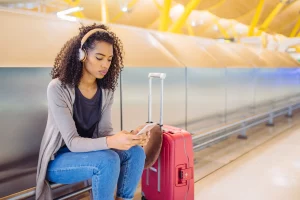Prepare Your Body Before You Travel
Before embarking on your journey, it’s crucial to prepare your body to withstand the potential stressors of travel. Start by ensuring you’re well-rested in the days leading up to your trip. Adequate rest helps bolster your immune system and prepares your body for any disruptions to your sleep schedule Feeling Sick on Your Trip. Additionally, maintain a healthy diet rich in nutrients and hydration to support your body’s defenses. Explore More About Health (Stress Causes Hiccups)
Stay Hydrated Throughout Your Journey
One of the most overlooked aspects of travel health is hydration. Dehydration can exacerbate symptoms of motion sickness and fatigue, leaving you feeling unwell during your trip. Make a conscious effort to drink plenty of water before, during, and after your travels. Avoid excessive consumption of caffeinated or alcoholic beverages, as these can contribute to dehydration.

Pack a Travel Wellness Kit
Being prepared can make all the difference in managing symptoms of illness while traveling. Pack a travel wellness kit containing essential items such as pain relievers, antacids, motion sickness medication, hand sanitizer, and disinfectant wipes. Having these items on hand can provide relief from common travel ailments and help prevent the spread of germs.
Practice Good Hygiene Habits
Maintaining proper hygiene is crucial for preventing illness while traveling. Wash your hands frequently with soap and water for at least 20 seconds, especially before eating or touching your face. If soap and water are not available, use hand sanitizer with at least 60% alcohol. Avoid touching your face, particularly your eyes, nose, and mouth, as this can introduce germs into your system.
Choose Healthy Eating Options
Eating well on the road can be challenging, but making healthy choices can go a long way in supporting your overall well-being. Opt for nutrient-dense foods such as fruits, vegetables, lean proteins, and whole grains. Avoid consuming excessive amounts of sugar and processed foods, as these can contribute to feelings of lethargy and discomfort.
Manage Stress and Anxiety
Traveling can be inherently stressful, which can take a toll on both your physical and mental health. Take proactive steps to manage stress and anxiety by practicing relaxation techniques such as deep breathing, meditation, or yoga. Engage in activities that bring you joy and help you unwind, whether it’s listening to music, reading a book, or going for a leisurely stroll.
Get Sufficient Rest
In the midst of excitement and adventure, it’s essential not to overlook the importance of rest and relaxation. Aim to get an adequate amount of sleep each night, even if it means adjusting to a new time zone. Create a restful sleep environment by limiting exposure to screens before bedtime and ensuring your accommodations are comfortable and conducive to sleep.
Stay Active While Traveling
Physical activity can help alleviate feelings of fatigue and boost your mood while traveling. Incorporate movement into your daily routine, whether it’s taking a brisk walk, exploring a new city on foot, or practicing yoga in your hotel room. Not only does exercise support your overall well-being, but it can also enhance your enjoyment of the travel experience.

Listen to Your Body
Above all, listen to your body’s signals and respond accordingly. If you start to feel unwell during your trip, don’t ignore the symptoms. Take the time to rest, hydrate, and seek medical attention if necessary. Self-care is paramount, and prioritizing your health will ensure you can fully enjoy your travel adventures.
Comparison of Key Travel Wellness Products
| Product | Purpose | Advantages | Disadvantages |
|---|---|---|---|
| Pain Relievers | Relieve minor aches and pains | – Provides quick relief from discomfort<br>- Easy to carry and use | – May cause side effects such as stomach irritation<br>- Not suitable for all individuals |
| Antacids | Alleviate symptoms of indigestion | – Neutralizes stomach acid<br>- Helps relieve heartburn and acid reflux | – Temporary relief<br>- May interact with certain medications |
| Motion Sickness Medication | Prevent or reduce motion sickness | – Effectively prevents nausea and vomiting<br>- Available in various forms (pills, patches, wristbands) | – May cause drowsiness<br>- Potential side effects such as dry mouth and blurred vision |
| Hand Sanitizer | Kill germs and prevent infection | – Convenient and portable<br>- Effective against a wide range of germs | – Does not remove visible dirt or grime<br>- May not be as effective as handwashing with soap and water |
| Disinfectant Wipes | Sanitize surfaces and objects | – Easy to use<br>- Kills bacteria and viruses on contact | – Limited effectiveness against certain pathogens<br>- May leave residue on surfaces |
Remember, feeling sick doesn’t have to ruin your trip. By taking proactive steps to care for your body and mind, you can minimize the risk of illness and maximize the enjoyment of your travel experiences.












